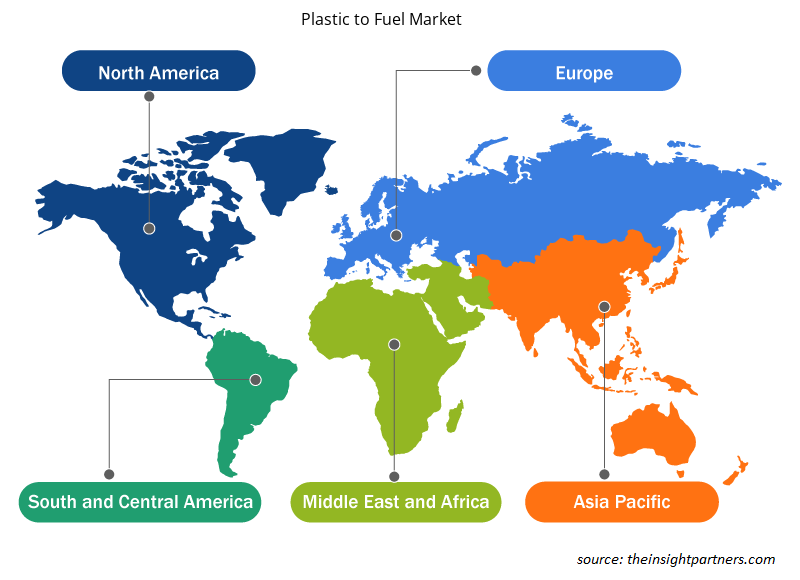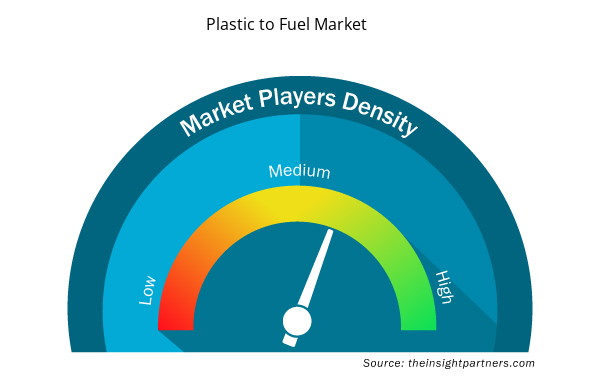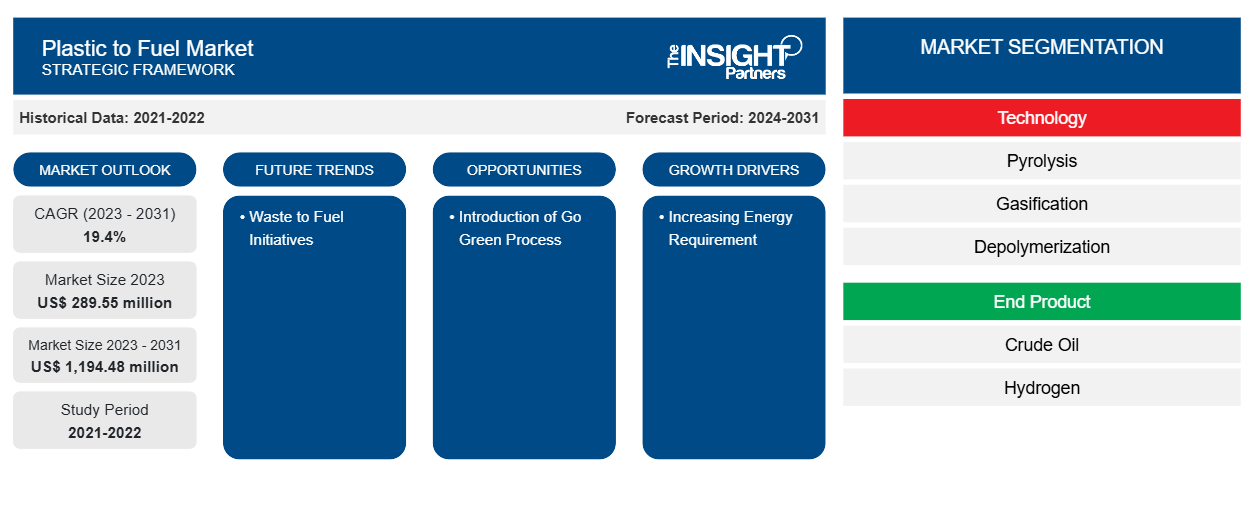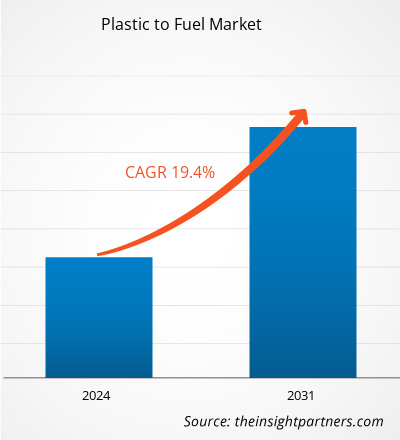من المتوقع أن يصل حجم سوق تحويل البلاستيك إلى وقود إلى 1,194.48 مليون دولار أمريكي بحلول عام 2031 من 289.55 مليون دولار أمريكي في عام 2023. ومن المتوقع أن يسجل السوق معدل نمو سنوي مركب بنسبة 19.4٪ في الفترة 2023-2031. ومن المرجح أن يظل التطور التقني المستمر في إعادة التدوير والتخلص من النفايات أحد الاتجاهات الرئيسية لسوق تحويل البلاستيك إلى وقود.
تحليل سوق تحويل البلاستيك إلى وقود
من المتوقع أن يؤدي الوعي المتزايد بشأن انبعاثات الغازات المسببة للاحتباس الحراري إلى دفع نمو البلاستيك في سوق الوقود. تشكل البوليمرات غير القابلة لإعادة التدوير مثل البولي إيثيلين تيريفثالات (PET) والبوليسترين وكلوريد البولي فينيل (PVC) مصدر قلق كبير في الوقت الحالي. لا يتم إعادة تدوير أكثر من 90٪ من البلاستيك ويتم التخلص منه أو دفنه أو سكبه في المحيط بدلاً من ذلك. تم جمع وإعادة تدوير 9-10٪ فقط من نفايات البلاستيك، مما يعني أنه تم جمع وإعادة تدوير 9-10٪ فقط من نفايات البلاستيك. يفتح هذا إمكانات سوقية ضخمة لصناعة تحويل البلاستيك إلى وقود حيث أن إعادة تدوير هذه النفايات البلاستيكية ستنتج نفايات بلاستيكية غير قابلة لإعادة التدوير يمكن استخدامها في PFT في المستقبل غير البعيد.
نظرة عامة على سوق تحويل البلاستيك إلى وقود
مع النمو السكاني، والتطور الاقتصادي السريع، والتحضر المستمر، والتغيرات في نمط الحياة، يتزايد إنتاج واستهلاك النفايات البلاستيكية بمعدل مرتفع. كانت النفايات البلاستيكية مصدر قلق متزايد في جميع أنحاء العالم في السنوات الأخيرة. ومع الاعتماد المتزايد على البلاستيك، أصبحت ممارسة التخلص من البلاستيك بتهور تقليدية. تم إنشاء العديد من إجراءات تحويل النفايات إلى ثروة على مر السنين لإعادة تدوير وإعادة استخدام البلاستيك بطرق مبتكرة. يعد تحويل النفايات البلاستيكية إلى وقود وجعلها قابلة للاستخدام للاحتياجات الصناعية والسكنية أحد الابتكارات الحالية. تم تحويل البلاستيك إلى وقود بشكل فعال في وقت سابق في دول مثل ألمانيا والولايات المتحدة واليابان. كانت هذه الدول الثلاث أيضًا فعالة في تحويل إجراءات التحويل إلى نماذج شركات قابلة للتطبيق. وبالمثل، تتبنى دول مثل كندا والهند تدريجيًا عملية تحويل البلاستيك إلى وقود.
قم بتخصيص هذا التقرير ليناسب متطلباتك
ستحصل على تخصيص لأي تقرير - مجانًا - بما في ذلك أجزاء من هذا التقرير، أو تحليل على مستوى الدولة، وحزمة بيانات Excel، بالإضافة إلى الاستفادة من العروض والخصومات الرائعة للشركات الناشئة والجامعات
- احصل على أهم اتجاهات السوق الرئيسية لهذا التقرير.ستتضمن هذه العينة المجانية تحليلاً للبيانات، بدءًا من اتجاهات السوق وحتى التقديرات والتوقعات.
محركات وفرص سوق الوقود البلاستيكي
زيادة متطلبات الطاقة تدفع الطلب على تقنيات الوقود البلاستيكي
تلعب الكهرباء دورًا حاسمًا، وهي تشكل نسبة متزايدة من خدمات الطاقة. ومع تزايد الدخل المتاح، ووعي المستهلك، وكهربة وسائل النقل والتدفئة، وزيادة الطلب على الأدوات الرقمية وتكييف الهواء، من المتوقع أن يرتفع الطلب على الطاقة بشكل أكبر. تعمل سياسات الحكومة والتكنولوجيا المتاحة بما يتماشى مع سيناريو السياسات لتحويل إمدادات الطاقة نحو مصادر منخفضة الكربون، مما يعزز الطلب على تكنولوجيا البلاستيك للوقود على مستوى العالم. إن إمكانية الوصول التجاري لمجموعة من تقنيات توليد الانبعاثات المنخفضة تضع الكهرباء في طليعة الجهود المبذولة لمكافحة تغير المناخ والتلوث، مما يزيد من الطلب على الحلول البديلة، مما يؤدي بالتالي إلى توسع سوق البلاستيك للوقود.
مقدمة لعملية التحول إلى الأخضر - فرصة في سوق البلاستيك للوقود
بدأت مبادرات تحويل البلاستيك إلى وقود تكتسب زخماً في صناعة الطاقة مع تزايد وعي الناس بالأضرار البيئية الناجمة عن البلاستيك الذي يستخدم لمرة واحدة وممارسات إعادة التدوير غير الكافية التي يتبعها الناس. وهذا يدفع الباحثين إلى البحث عن طرق مبتكرة للتخلص من الإنتاج المتزايد من البلاستيك. ومن المتوقع أن توفر زيادة الإعانات الحكومية لتطوير التكنولوجيا الخضراء ومحاولات تشجيع مثل هذه التقنيات من خلال التمويل الموسع فرص نمو كبيرة في السوق. وعلاوة على ذلك، فإن اللوائح الحكومية القوية المتعلقة بأمن الطاقة تضغط على الشركات للاستثمار في البحوث الصديقة للبيئة. ويشكل تحويل البلاستيك إلى وقود خياراً واعداً ليس فقط للحد من التلوث ولكن أيضاً لتحقيق فوائد اقتصادية كبيرة للمناطق.
تقرير تحليل تجزئة سوق تحويل البلاستيك إلى وقود
إن القطاعات الرئيسية التي ساهمت في اشتقاق تحليل سوق البلاستيك إلى وقود هي التكنولوجيا والمنتج النهائي.
- استنادًا إلى التكنولوجيا، تم تقسيم سوق تحويل البلاستيك إلى وقود إلى التحلل الحراري والتغويز وإزالة البلمرة. احتل قطاع التحلل الحراري حصة سوقية أكبر في عام 2023.
- من حيث المنتج النهائي، تم تقسيم السوق إلى النفط الخام والهيدروجين وغيرهما. يهيمن قطاع النفط الخام على السوق في عام 2023.
تحليل حصة سوق تحويل البلاستيك إلى وقود حسب المنطقة الجغرافية
ينقسم النطاق الجغرافي لتقرير سوق البلاستيك إلى وقود بشكل أساسي إلى خمس مناطق: أمريكا الشمالية، وآسيا والمحيط الهادئ، وأوروبا، والشرق الأوسط وأفريقيا، وأمريكا الجنوبية/أمريكا الجنوبية والوسطى.
تضم منطقة آسيا والمحيط الهادئ العديد من البلدان النامية، بما في ذلك الصين والهند. وهما أيضًا أكبر دولتين من حيث عدد السكان في جميع أنحاء العالم. يتم إلقاء هذه النفايات البلاستيكية إما في مكبات النفايات أو المحيط، مما يؤدي إلى ملء البيئة وترك آثار سلبية طويلة الأجل في جميع أنحاء العالم. علاوة على ذلك، تمتلك منطقة آسيا والمحيط الهادئ الحصة الكبرى من تلوث البلاستيك البحري مع مساهمين رئيسيين مثل الصين وإندونيسيا وسريلانكا وفيتنام والفلبين. البنية التحتية غير الفعّالة لإدارة النفايات والافتقار إلى الوعي بشأن التأثير الضار للبلاستيك للاستخدام مرة واحدة هي الأسباب الرئيسية التي تساهم في ارتفاع النفايات البلاستيكية في جميع أنحاء المنطقة. إن الاستثمارات المتزايدة من قبل الحكومات والمنظمات الخاصة لتعزيز إعادة تدوير البلاستيك إلى مواد قابلة لإعادة الاستخدام تدفع نمو سوق البلاستيك للوقود في جميع أنحاء المنطقة. ونظرًا للزيادة في الاستثمارات في إعادة تدوير النفايات البلاستيكية في جميع أنحاء المنطقة، يستثمر اللاعبون في سوق البلاستيك للوقود أيضًا في توسيع أعمالهم في جميع أنحاء المنطقة، مما يدفع نمو سوق البلاستيك للوقود في منطقة آسيا والمحيط الهادئ.
رؤى إقليمية حول سوق تحويل البلاستيك إلى وقود
لقد قام المحللون في Insight Partners بشرح الاتجاهات والعوامل الإقليمية المؤثرة على سوق تحويل البلاستيك إلى وقود طوال فترة التوقعات بشكل شامل. يناقش هذا القسم أيضًا قطاعات سوق تحويل البلاستيك إلى وقود والجغرافيا في جميع أنحاء أمريكا الشمالية وأوروبا ومنطقة آسيا والمحيط الهادئ والشرق الأوسط وأفريقيا وأمريكا الجنوبية والوسطى.

- احصل على البيانات الإقليمية المحددة لسوق تحويل البلاستيك إلى وقود
نطاق تقرير سوق تحويل البلاستيك إلى وقود
| سمة التقرير | تفاصيل |
|---|---|
| حجم السوق في عام 2023 | 289.55 مليون دولار أمريكي |
| حجم السوق بحلول عام 2031 | 1,194.48 مليون دولار أمريكي |
| معدل النمو السنوي المركب العالمي (2023 - 2031) | 19.4% |
| البيانات التاريخية | 2021-2022 |
| فترة التنبؤ | 2024-2031 |
| القطاعات المغطاة | حسب التكنولوجيا
|
| المناطق والدول المغطاة | أمريكا الشمالية
|
| قادة السوق وملفات تعريف الشركات الرئيسية |
|
كثافة اللاعبين في السوق: فهم تأثيرها على ديناميكيات الأعمال
يشهد سوق تحويل البلاستيك إلى وقود نموًا سريعًا، مدفوعًا بالطلب المتزايد من المستخدم النهائي بسبب عوامل مثل تفضيلات المستهلكين المتطورة والتقدم التكنولوجي والوعي المتزايد بفوائد المنتج. ومع ارتفاع الطلب، تعمل الشركات على توسيع عروضها والابتكار لتلبية احتياجات المستهلكين والاستفادة من الاتجاهات الناشئة، مما يؤدي إلى زيادة نمو السوق.
تشير كثافة اللاعبين في السوق إلى توزيع الشركات أو المؤسسات العاملة في سوق أو صناعة معينة. وهي تشير إلى عدد المنافسين (اللاعبين في السوق) الموجودين في مساحة سوق معينة نسبة إلى حجمها أو قيمتها السوقية الإجمالية.
الشركات الرئيسية العاملة في سوق تحويل البلاستيك إلى وقود هي:
- أجيليكس، المحدودة
- زيت كاساندرا ايه بي
- شركة كلين للصناعات
- شركة نكسس فيولز المحدودة
- تكنولوجيات إعادة التدوير المحدودة
- شركة أجايل بروسيس للمواد الكيميائية المحدودة
إخلاء المسؤولية : الشركات المذكورة أعلاه ليست مرتبة بأي ترتيب معين.

- احصل على نظرة عامة على أهم اللاعبين الرئيسيين في سوق تحويل البلاستيك إلى وقود
أخبار وتطورات سوق تحويل البلاستيك إلى وقود
يتم تقييم سوق تحويل البلاستيك إلى وقود من خلال جمع البيانات النوعية والكمية بعد البحث الأولي والثانوي، والتي تتضمن منشورات الشركات المهمة وبيانات الجمعيات وقواعد البيانات. فيما يلي قائمة بالتطورات في السوق فيما يتعلق بالابتكارات وتوسيع الأعمال والاستراتيجيات:
- في فبراير 2022، تعاونت Agilyx وVirgin Group في شراكة استراتيجية للبحث والتطوير في مرافق الوقود منخفضة الكربون لدعم معالجة التلوث البلاستيكي ودعم أجندة التحول العالمي إلى صافي صفر. (المصدر: Agilyx, Inc، بيان صحفي/موقع الشركة على الويب/النشرة الإخبارية)
- في نوفمبر 2022، تعاونت شركة Klean Industries مع شركة RGH Systems لتطوير منشأة لتحويل النفايات البلاستيكية إلى طاقة في الفلبين. (المصدر: Klean Industries Inc.، بيان صحفي/موقع الشركة على الويب/النشرة الإخبارية)
تقرير سوق تحويل البلاستيك إلى وقود: التغطية والنتائج المتوقعة
يقدم تقرير "حجم سوق البلاستيك كوقود وتوقعاته (2021-2031)" تحليلاً مفصلاً للسوق يغطي المجالات التالية:
- حجم أسواق البلاستيك والوقود والتوقعات على المستويات العالمية والإقليمية والوطنية لجميع قطاعات السوق الرئيسية التي يغطيها النطاق
- ديناميكيات السوق مثل المحركات والقيود والفرص الرئيسية
- اتجاهات سوق تحويل البلاستيك إلى وقود
- تحليل مفصل لـ PEST و SWOT
- تحليل سوق تحويل البلاستيك إلى وقود يغطي اتجاهات السوق الرئيسية والإطار العالمي والإقليمي والجهات الفاعلة الرئيسية واللوائح والتطورات الأخيرة في السوق
- صناعة البلاستيك والوقود، تحليل المشهد والمنافسة، وتغطية تركيز السوق، وتحليل خريطة الحرارة، واللاعبين البارزين، والتطورات الأخيرة
- ملفات تعريف الشركة التفصيلية
- التحليل التاريخي (سنتان)، السنة الأساسية، التوقعات (7 سنوات) مع معدل النمو السنوي المركب
- تحليل PEST و SWOT
- حجم السوق والقيمة / الحجم - عالميًا وإقليميًا وقطريًا
- الصناعة والمنافسة
- مجموعة بيانات Excel



Report Coverage
Revenue forecast, Company Analysis, Industry landscape, Growth factors, and Trends

Segment Covered
This text is related
to segments covered.

Regional Scope
North America, Europe, Asia Pacific, Middle East & Africa, South & Central America

Country Scope
This text is related
to country scope.
Trends and growth analysis reports related to Energy and Power : READ MORE..
The Insight Partners performs research in 4 major stages: Data Collection & Secondary Research, Primary Research, Data Analysis and Data Triangulation & Final Review.
- Data Collection and Secondary Research:
As a market research and consulting firm operating from a decade, we have published and advised several client across the globe. First step for any study will start with an assessment of currently available data and insights from existing reports. Further, historical and current market information is collected from Investor Presentations, Annual Reports, SEC Filings, etc., and other information related to company’s performance and market positioning are gathered from Paid Databases (Factiva, Hoovers, and Reuters) and various other publications available in public domain.
Several associations trade associates, technical forums, institutes, societies and organization are accessed to gain technical as well as market related insights through their publications such as research papers, blogs and press releases related to the studies are referred to get cues about the market. Further, white papers, journals, magazines, and other news articles published in last 3 years are scrutinized and analyzed to understand the current market trends.
- Primary Research:
The primarily interview analysis comprise of data obtained from industry participants interview and answers to survey questions gathered by in-house primary team.
For primary research, interviews are conducted with industry experts/CEOs/Marketing Managers/VPs/Subject Matter Experts from both demand and supply side to get a 360-degree view of the market. The primary team conducts several interviews based on the complexity of the markets to understand the various market trends and dynamics which makes research more credible and precise.
A typical research interview fulfils the following functions:
- Provides first-hand information on the market size, market trends, growth trends, competitive landscape, and outlook
- Validates and strengthens in-house secondary research findings
- Develops the analysis team’s expertise and market understanding
Primary research involves email interactions and telephone interviews for each market, category, segment, and sub-segment across geographies. The participants who typically take part in such a process include, but are not limited to:
- Industry participants: VPs, business development managers, market intelligence managers and national sales managers
- Outside experts: Valuation experts, research analysts and key opinion leaders specializing in the electronics and semiconductor industry.
Below is the breakup of our primary respondents by company, designation, and region:

Once we receive the confirmation from primary research sources or primary respondents, we finalize the base year market estimation and forecast the data as per the macroeconomic and microeconomic factors assessed during data collection.
- Data Analysis:
Once data is validated through both secondary as well as primary respondents, we finalize the market estimations by hypothesis formulation and factor analysis at regional and country level.
- Macro-Economic Factor Analysis:
We analyse macroeconomic indicators such the gross domestic product (GDP), increase in the demand for goods and services across industries, technological advancement, regional economic growth, governmental policies, the influence of COVID-19, PEST analysis, and other aspects. This analysis aids in setting benchmarks for various nations/regions and approximating market splits. Additionally, the general trend of the aforementioned components aid in determining the market's development possibilities.
- Country Level Data:
Various factors that are especially aligned to the country are taken into account to determine the market size for a certain area and country, including the presence of vendors, such as headquarters and offices, the country's GDP, demand patterns, and industry growth. To comprehend the market dynamics for the nation, a number of growth variables, inhibitors, application areas, and current market trends are researched. The aforementioned elements aid in determining the country's overall market's growth potential.
- Company Profile:
The “Table of Contents” is formulated by listing and analyzing more than 25 - 30 companies operating in the market ecosystem across geographies. However, we profile only 10 companies as a standard practice in our syndicate reports. These 10 companies comprise leading, emerging, and regional players. Nonetheless, our analysis is not restricted to the 10 listed companies, we also analyze other companies present in the market to develop a holistic view and understand the prevailing trends. The “Company Profiles” section in the report covers key facts, business description, products & services, financial information, SWOT analysis, and key developments. The financial information presented is extracted from the annual reports and official documents of the publicly listed companies. Upon collecting the information for the sections of respective companies, we verify them via various primary sources and then compile the data in respective company profiles. The company level information helps us in deriving the base number as well as in forecasting the market size.
- Developing Base Number:
Aggregation of sales statistics (2020-2022) and macro-economic factor, and other secondary and primary research insights are utilized to arrive at base number and related market shares for 2022. The data gaps are identified in this step and relevant market data is analyzed, collected from paid primary interviews or databases. On finalizing the base year market size, forecasts are developed on the basis of macro-economic, industry and market growth factors and company level analysis.
- Data Triangulation and Final Review:
The market findings and base year market size calculations are validated from supply as well as demand side. Demand side validations are based on macro-economic factor analysis and benchmarks for respective regions and countries. In case of supply side validations, revenues of major companies are estimated (in case not available) based on industry benchmark, approximate number of employees, product portfolio, and primary interviews revenues are gathered. Further revenue from target product/service segment is assessed to avoid overshooting of market statistics. In case of heavy deviations between supply and demand side values, all thes steps are repeated to achieve synchronization.
We follow an iterative model, wherein we share our research findings with Subject Matter Experts (SME’s) and Key Opinion Leaders (KOLs) until consensus view of the market is not formulated – this model negates any drastic deviation in the opinions of experts. Only validated and universally acceptable research findings are quoted in our reports.
We have important check points that we use to validate our research findings – which we call – data triangulation, where we validate the information, we generate from secondary sources with primary interviews and then we re-validate with our internal data bases and Subject matter experts. This comprehensive model enables us to deliver high quality, reliable data in shortest possible time.


 احصل على عينة مجانية لهذا التقرير
احصل على عينة مجانية لهذا التقرير